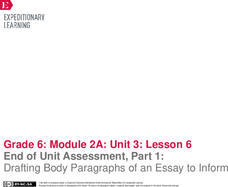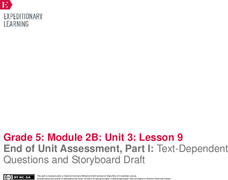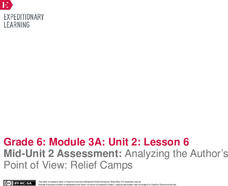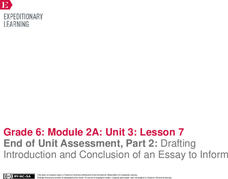EngageNY
End of Unit Assessment: How Word Choice Contributes to Tone and Meaning
It's finally time for pupils to show what they know! Scholars finalize the unit with an end-of-unit assessment. They use the book Inside Out & Back Again and the "Forgotten Ship" transcript to examine word choice, tone, and...
EngageNY
Finding Relevant Information and Asking Research Questions: The Benefits of Video Games
Video games may not be so bad after all. As scholars read the text "The Many Benefits, for Kids, of Playing Video Games," they summarize the gist in their researchers' notebooks. Next, pupils draft supporting research questions based on...
EngageNY
End of Unit Assessment: Drafting the Informative Consumer Guide
Not all sandwiches are edible. Scholars use a Quote Sandwich graphic organizer to draft the written content of their informative consumer guides. Additionally, they view a mini-lesson on formal writing.
EngageNY
Organizing an Opinion, Reasons, and Evidence: Text 2 for Each Expert Group
The proof is in the reading. Using the informative resource, scholars read a second article about either Althea Gibson or Roberto Clemente. As they read, they continue adding reasons and evidence to their graphic organizers to show how...
EngageNY
Reading for Gist and Answering Text-Dependent Questions: Local Sustainable Food Chain
Readers use sticky notes and a Reading Closely: Guiding Questions handout to record the gist of a different section (pages 161-166) in The Omnivore’s Dilemma. They then pair up and share their ideas. To end the lesson, readers complete...
Core Knowledge Foundation
Plants Tell It Again!™ Read-Aloud Anthology
A 190-page anthology explores the life and parts of plants, flowers, and trees while boosting reading comprehension skills. Literature and informational texts showcase Johnny Appleseed and George Washington Carver. Lessons follow the...
EngageNY
End of Unit Assessment, Part 1: Drafting Body Paragraphs of an Essay to Inform
Anybody can write a body paragraph! Pupils analyze the development of ideas in a body paragraph from a model essay. Next, using what they've learned, they draft the body paragraphs of their My Rule to Live By informative essay.
EngageNY
End of Unit Assessment, Part 1: Text-Dependent Questions and Storyboard Draft: “You Can Do a Graphic Novel” Excerpt
Eyes on the finish line. Serving as the first part of the end of unit assessment, learners answer questions based on a text about how to write a graphic novel. Using what they've learned, they then create a storyboard about the invention...
EngageNY
Main Ideas in Informational Text: Analyzing a Firsthand Human Rights Account
Although this is part of a series, lesson plan nine has your class take a break from their close study of the Universal Declaration of Human Rights (UDHR) text to read the firsthand account “Teaching Nepalis to Read, Plant, and Vote” by...
EngageNY
Main Ideas in Informational Text: Analyzing a Firsthand Human Rights Account for Connections to Specific Articles of the UDHR
Lesson 10 in a series of human rights lessons focuses on the skills of finding evidence and summarizing. Your young readers work to compare the two texts they have read in this unit: the Universal Declaration of Human Rights...
EngageNY
Organizing Evidence from Multiple Informational Texts to Prepare for Writing: What Makes an Earthquake a Natural Disaster?
Fifth graders prepare for their end of the unit essay assessment by continuing to look at what makes an earthquake a natural disaster. They complete a graphic organizer and write a topic sentence. To finish, they view a model essay and...
EngageNY
Mid-Unit 2 Assessment: Analyzing the Author’s Point of View: Relief Camps
We're halfway there ... what a relief! Scholars read an excerpt from a primary source about the relief camps associated with the1906 San Francisco earthquake. Next, they complete a mid-unit assessment, answering short-answer and...
EngageNY
Mid-Unit 3 Assessment, Part II: Organizing Notes for a Public Speech
It's all a matter of opinion! Pupils take Part II of the mid-unit assessment, in which they continue organizing their notes in preparation for writing an opinion speech. Using the resource, they add reasons, evidence, and a concluding...
EngageNY
End of Unit Assessment Part II: Science Talk
Scholars complete Part 2 of their end of unit assessment by having a science talk. Pupils pair up to answer questions about what makes a natural disaster. As one learner talks, the other records what is said. They then trade places.
EngageNY
Grade 9 ELA Module 2, Unit 3, Lesson 12
As the first in a two-part, end-of-unit assessment that encourages readers to synthesize the unit's main ideas, class members review their notes for each of the three texts they read and develop three open-ended discussion questions...
EngageNY
Grade 9 ELA Module 3, Unit 1, Lesson 9
Keeping animals relaxed and comfortable has numerous benefits. Explore Temple Grandin's unique perspective on animal behavior with a lesson that concentrates on a central idea within the text. High schoolers prepare for the final...
National Museum of the American Indian
The A:Shiwi (Zuni) People: A Study in Environment, Adaptation, and Agricultural Practices
Discover the connection of native peoples to their natural world, including cultural and agricultural practices, by studying the Zuni people of the American Southwest. This lesson includes examining a poster's photographs, reading...
EngageNY
Reading and Taking Notes on Colonial Trades
In the tenth instructional activity of this unit, young scholars learn to categorize information as they continue researching their colonial trade. During guided practice, the teacher models how to read informational text slowly while...
Core Knowledge Foundation
Early Presidents and Social Reformers
A unit by Core Knowledge begins with information about early United States presidents. Pupils then explore social reformers such as Sojourner Truth and Frederick Douglas, abolitionism, women's rights, and more. Participants listen and...
Curated OER
Rockefeller's Revenge: Exxon and Mobil Unite
Study the impact and possible outcomes of the Exxon-Mobil merger in your language arts, social studies, or economics class. Secondary learners evaluate a series of graphs, write a paragraph interpreting the data, and engage in class...
Core Knowledge Foundation
The Civil War
A unit covers many aspects of the Civil War. Over six weeks, fifth graders delve deep into the history of slavery, the Civil War—before, during, and after—Abraham Lincoln, women's contributions, the Emancipation Proclamation, and...
Core Knowledge Foundation
The U.S. Civil War Tell It Again!™ Read-Aloud Anthology
Over three weeks, second graders listen to stories about the United States Civil War. Informational texts explore the war, slavery, Harriet Tubman, Abraham Lincoln, Robert E. Lee, Clara Barton, the Emancipation Proclamation, and Ulysses...
EngageNY
Grade 9 ELA Module 2, Unit 3, Lesson 5
After rereading the full text of Walter Mosley's essay "True Crime," groups complete an evidence collection tool worksheet, and then class members independently draft a multi-paragraph, evidence-based response that identifies how Mosley...
EngageNY
End of Unit Assessment, Part 2: Drafting Introduction and Conclusion of an Essay to Inform
A powerful introduction and conclusion can really pack a punch. Using the resource, scholars first read and discuss a model essay. Then, as part of the end of unit assessment, they draft the introductory and concluding paragraphs of...

























